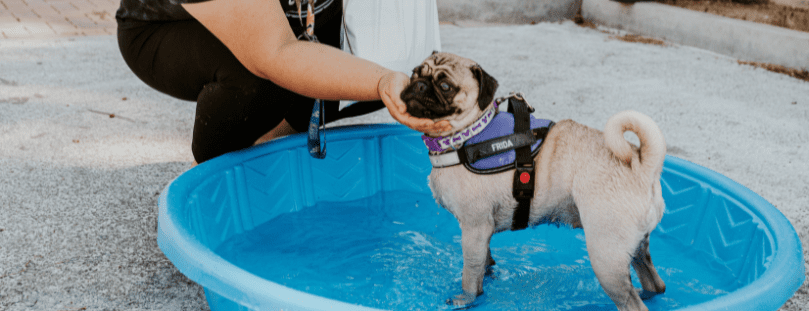
By Judy Bellack, Industry Principal, The Pet-Inclusive Housing Initiative
Summer is almost upon us and that means rising temps, pools and cookouts, fireworks displays and afternoon storms . . . which also means making sure our beloved pets are safely enjoying a season that can present some particular challenges.
Here are some tips for keeping our furry friends in mind over the summer months:
Hot, hot, hot!
With rising temperatures across the country – in fact, record-breaking temps in some areas – we must remember that our pets handle heat very differently from humans. In fact, heatstroke is the number one cause of death for dogs during the summer. Here are some great tips from the Humane Society of the United States (read the full article here) for keeping pets comfortable:
- A pet in a parked vehicle is not cool
- Not cool at all, either of the meanings! Please don’t leave your pet in a parked car, even with a window cracked, even for a brief period of time. If you see a pet in a parked car on a warm day, notify local animal control or law enforcement immediately; you could be saving a life. Even when the temps outside are mild, after an hour, temps inside the car can be up to 43 degrees hotter.
- During hot summer months, strenuous, and even regular exercise can be dangerous for pets
- Dogs and cats can’t sweat like we can, relying on panting and sweating through the bottoms of their paws to cool down. Early morning and late evening walks are best. Make sure to pack a bowl and some water and take frequent breaks. If you have to take your kitty outdoors in a carrier, ensure it is well ventilated and secure.
- If your pet is left outdoors, make sure they always have access to shade and fresh water
- Even a quick errand can unexpectedly turn into hours; the safest route is to bring them indoors if you’re leaving the house. Play pools and shade are great for dogs that prefer to remain outdoors.
- Be aware of the signs of heat stroke
- Excessive panting, dark or bright red tongue and gums, lethargy, stumbling, seizures, bloody diarrhea or vomiting are danger signs!
- If your pet has displayed the above signs but seems fine a short while later, don’t assume everything is OK; the safest route is to seek veterinary care ASAP.
Fireworks – and nature’s fireworks, thunderstorms
Many pets are noise-sensitive or afraid of fireworks and thunderstorms, and these loud sounds can send them into a stressed-out frenzy or drive them under beds (or worse, out the door in an attempt to “escape” the noise).
- Make sure your pets are microchipped and wearing proper ID!
- A door-bolter may become even more afraid once outside and take off, becoming lost and disoriented. Your pet’s microchip and collar ID are important steps to help you reunite with them as quickly as possible.
- Create a safe space for your pet
- A kennel, a cozy bed near you, a quiet room of the house . . . and closing blinds or curtains to diminish bright flashes will also help. Asking “Alexa” to turn on some classical and soothing music works well too.
- Exercise and feed your pet
- Getting exercise will help release energy and a solid meal a couple of hours before anticipated fireworks or storms will help them feel content and relaxed
- In extreme circumstances, provide some form of relaxant for your pet
- A weighted vest or shirt (such as Thundershirt) may provide a sense of security
- There are also a plethora of calming treats that may help with nerves; your vet will have some great recommendations
- Just as with humans, some sort of distraction may work: white noise, music, play
- Keep doors, windows and fence gates closed
- Again, pets may bolt through an opening out of fear; you want to take every precaution against this
- An ounce of prevention is worth a pound of cure
- Start socializing your puppy or kitten to noise when they’re young to avoid this stress altogether! Take them to noisy places and expose them to sudden sounds at home, beginning with low noises and then slowly increasing volume as they exhibit more comfort with noise.
We love our pets and want them to enjoy the summer months as much as we do! A little thought and planning will go a long way!
